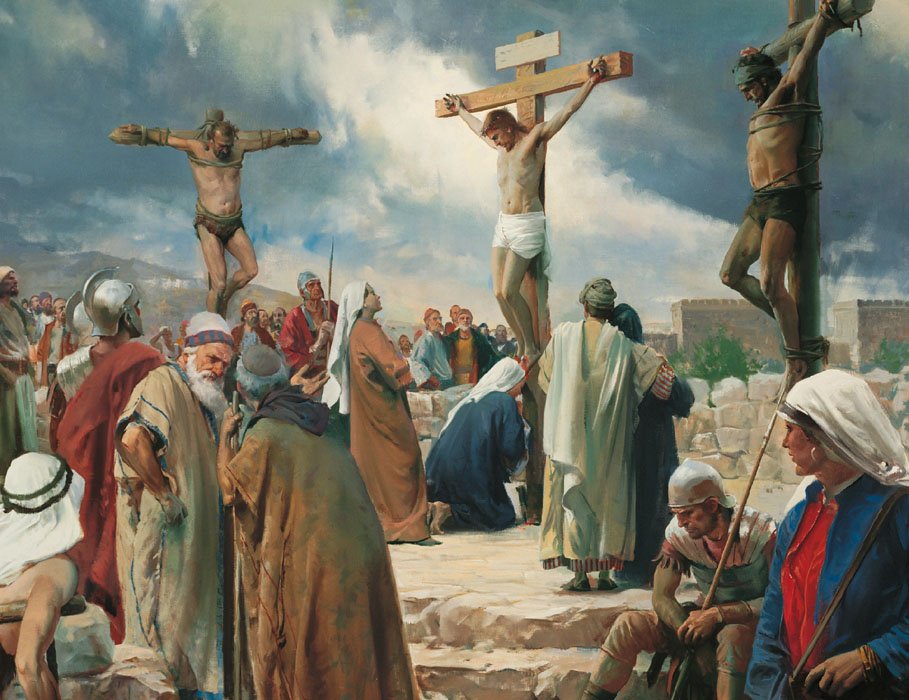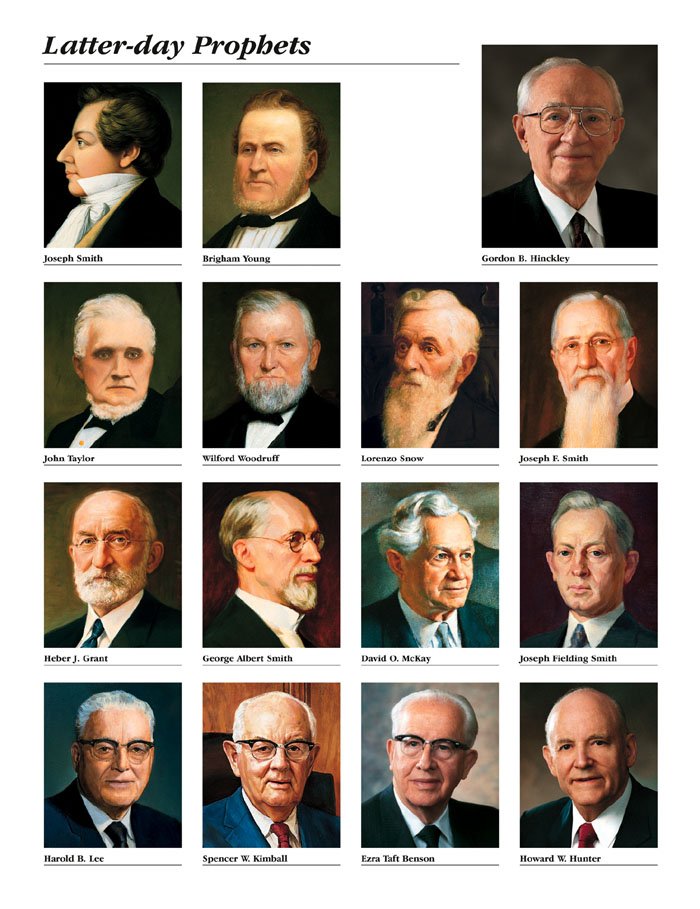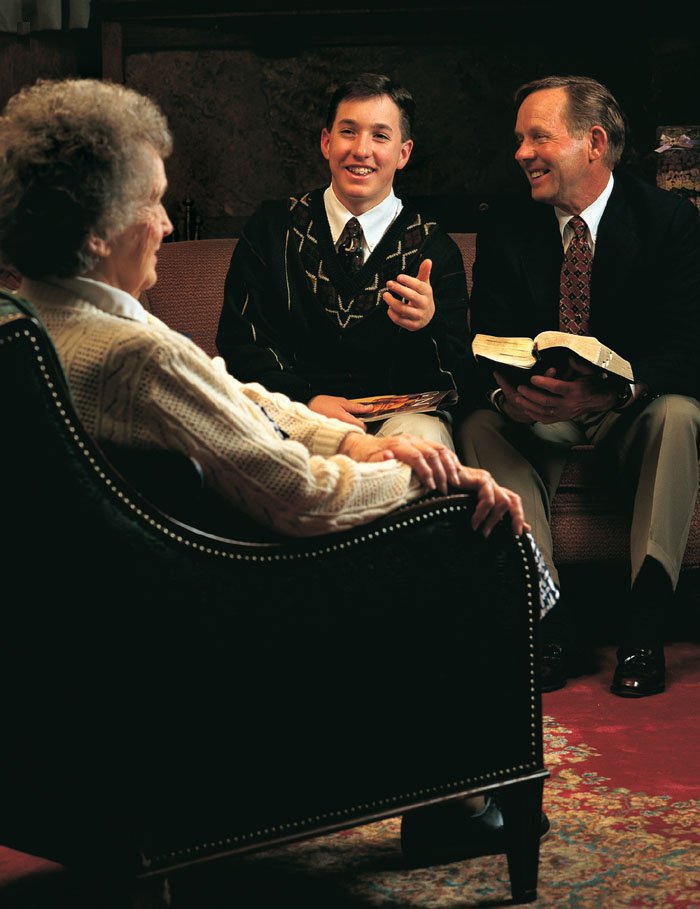|
|
|
|
 CHAPTER 5
CHAPTER 5Miser awaits the wanton rich—Await the Lord's coming with patience -- The elders are to anoint and heal the sick. |
||
|
1 GO to now, ye rich men, aweep
and howl for your miseries that shall come upon you.
2 Your ariches are corrupted, and your garments are motheaten. 3 Your agold and silver is bcankered; and the crust of them shall be a witness against you, and shall eat your flesh as it were fire. Ye have heaped treasure together for the last days.
|
 |
|
|
4 Behold, the ahire of the
blabourers who have reaped down your fields, which is of
you kept back by fraud, crieth: and the cries of them which have reaped are
entered into the ears of the Lord of sabaoth.
5 Ye have lived ain pleasure on the earth, and been wanton; ye have nourished your hearts, as in a day of slaughter. 6 Ye have condemned and killed the justa; and he doth not resist youb. |
6a Ye have condemned and killed the
just
 6b he doth not resist you 'Father forgive them, for they know not what they do.' The words of ultimate forgiveness spoken by the Savior from the cross applies not merely to the event of the crusifixion of the Lord. His forgiveness is given to all as a matter of his taking upon himself all the sins of the world which he accomplished in the Garden of Gethsemane. He did not merely suffer death which he does forgive mankind for, but he has suffered inocently for the whole of the sins of the earth that all through him might be so forgiven if they do but come unto him. He does not resist the sinner but says 'come unto to me ye who are so heavily ladden and burdened with sin, that your sins might be forgiven you.' As members of his Church we often tend to forget that this is Christ's offer to all of mankind. He encourages the sinner to come forth and to take their place among us as they through him may receive forgiveness of their sins and be made clean and whole. We too often look down our self-righteous noses at such as the sinners about us. But this is not the attitude and posture of the Lord. He welcomed the repentant sinner and encouraged them to come unto him, his fold and become a part of his people and kingdom with the promise that as they repent their sins, though of scarlet will be made as pure and white as the driven snow. |
|
|
7 Be patient therefore, brethren, unto the coming of
the Lorda. Behold, the
husbandman waiteth for the precious fruit of the earth, and hath long
patience for itb, until he
receive the early and latter rainc.
8 Be ye also apatient; bstablish your hearts: for the ccoming of the Lord draweth nigh. 9 a Grudge not one against another, brethren, lest ye be condemneda: behold, the judge standeth before the doorb.
 |
7a Be patient therefore, brethren, unto
the coming of the Lord Even in the early Church there was an
impatience for the second coming of the Lord. And men have impatiently await
that event not considering their particular self preparation for it. The
gospel plan is that men are to come to this earth to be tested and that
testing, proving if we would do all things that God doeth command us to do,
is for the duration of some 6,000 years and many, many generations. Only in
the Millenial Day will Satan be bound and all be sorted out. Until then we
are allowed our agency to prove ourselves herewith whether or not we will
come unto God of our own free will an accord, all being to our experience
of good and evil until that time. Yet all at thier own personal death do
have a 'sudden' coming to stand before the Lord. And it is this immediate
coming of the Lord rather than His Second Coming that we ought to have
primary before us in our personal preparations of coming to God rather than
always awaiting his coming unto us.
7b the husbandman waiteth for the precious fruit of the earth, and hath long patience for it The husbandman or he that cares for the field of harvest which is the earth, is patient for the precious fruit to develop and ripen. These expriences and trials of the tempting of our faith before God and those who will so come unto him, often take time. Alma the elder and the younger, as well as Paul the Apostle did not start out upon the Lord's side. Who is to say the length it will take some to finally mend their ways and turn and come unto the Lord. He patiently waits upon us to so turn and come unto him. 7c until he receive the early and latter rain These two particularly mentioned times, the early rain being that of the early Church in the time of Christ and the fruit of the harvest thereof and the latter rain as the times of the latter-days and the restoration of His Church in the fulness of times, are both to be fulfilled. The early Church was that centered about His mortal ministry and the fulfilment of the atoneing sacrafice for the sins of the world. Then for a space of time there after the Church is lost through apostasy until the latter rain, that rain of the day of once again the Ministering of Angels and the restoration in preparation for and centered about the purpose of his Second Coming when he shall come in his glory to rule and reign and judge the earth as the Glorious King of Heaven and Earth. 9a Grudge not one against another brethren, lest ye be condemned The whole key to the miracle of repentance and receiving of forgiveness it the ability to forgive all who have sinned against you. Consider Joseph of Egypt who did canker not his soul will hatred and begrudement against his brothers who had sold him into Egypt, but did forgive and set it aside as being the will of God unto a better fulfilment of purpose in the Lord that all that we experience in this life works for our good, benefit and understanding now and in the life to come. And Joseph is like unto Christ, who taketh and beareth the sins of all men upon himself, the inocent suffering the pains of the sins of all men that he might bring them in grace to stand before God. 9b behold, the judge standeth before the door Each of us have a personal door upon which the Spirit of Christ does knock and await for us to let Him in. There is no door latch upon the outside of that door. It is based upon our agency to open and let him into our lives. This is in the personal sense. It is also true in the general sense that he doeth wait upon his saints to prepare the way before him. Yet in that sense he will not wait upon each and every person as in the personal sense. It is up to us to prepare ourselves for that grand opening of that door of the Second Coming which is entrusted in the keys of the kingdom restored to the administration of his called servants who are to prepare the way before His Coming. And those of the world who look to his coming a prepare themselves properly, it will be well with them. But to those who count his servants and Him as naught, continuing to follow the ways of the world, wo will be unto them in that day when the servants of the Lord stand ready to recieve Him and they are not so prepared to stand before him. |
 |
|
10 Take, my brethren, the prophets, who have spoken
in the name of the Lorda, for an
aexample of
bsuffering affliction, and of patience.
11 Behold, we count them ahappy which bendure. Ye have heard of the patience of cJob, and have seen the end of the Lord; that the Lord is very dpitiful, and of tender emercy. 12 But above all things, my brethren, aswear not, neither by heaven, neither by the earth, neither by any other boath: but let your yea be yea; and your nay, nay; lest ye fall into condemnation. |
 10a Take, my brethren, the prophets, who have spoken in the name of the Lord We in traditional Christianity have looked to the words of the past prophets in the Bible and even in the Church we also tend to look to such past prophets of the Book of Mormon, which in both cases is well and good, but what we have before us to day is living Apostles and Prophets. Our conference sessions reveals a 'new volume of scripture' every six months. And though not cannonized as historical scripture, it is the Mind of the Lord, it is the Will of the Lord, the Word of the Lord and the Way of the Lord given to man in the most timely fashion, as current, as up to date and as readily personally applicable as any such scriptural word from God can ever be. For it is directed directly to us, concerning us and in real time, meaning live and in person from the ordained and anointed mouth pieces of the Lord, his servants the prophets, the modern prophets who speak directly to us concerning our day and time and what it is we are immediately facing and dealing with in our current daily walks of life. |
|
|
13 Is any among you aafflicted?
let him pray. Is any merry? let him sing psalms.
14 Is any asick among you? let him call for the belders of the church; and let them cpray over him, danointing him with oil in the name of the Lord: 15 And the aprayer of bfaith shall save the sick, and the Lord shall raise him up; and if he have committed sins, they shall be cforgiven him.
|
 |
|
|
16 aConfess your faults one
to another, and bpray one for another, that ye may be
healed. cThe effectual dfervent
eprayer of a righteous man availeth much.
17 Elias [Elijah] was a man subject to like apassions as we are, and he prayed earnestly that it might not rain: and it brained not on the earth by the space of three years and six months. 18 And he prayed again, and the heaven gave rain, and the earth brought forth her fruit. |
||
|
19 Brethren, if any of you do err from the truth, and one convert him;
20 Let him know, that he which aconverteth the sinner from the error of his way shall bsave a soul from death, and shall hide a multitude of sinsa. |
20a he which converteth the sinner from
the error of his way shall save a soul from death, and shall hide a
multitude of sins
 |
|